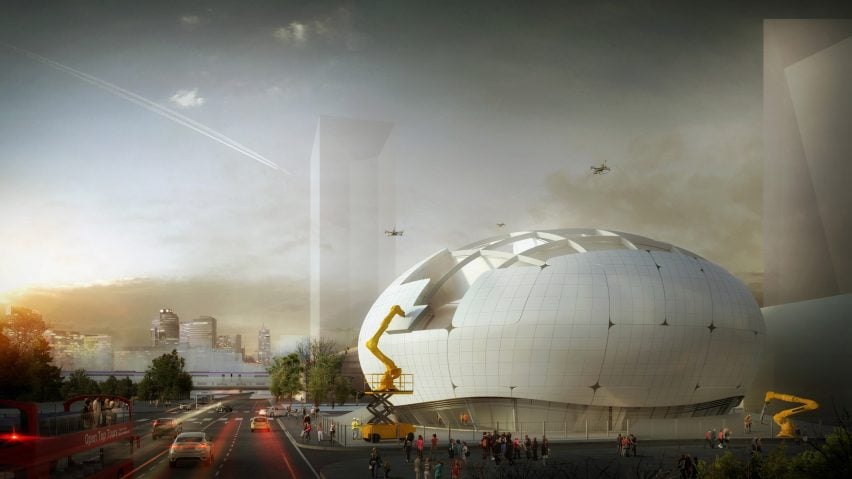Melike Altınışık Architects has unveiled plans for a Robot Science Museum in Seoul, which will be built using robotic construction techniques and drones.
Robots will be used to construct the curving metal facade of the building in the South Korean capital, which the Seoul Metropolitan Government has commissioned to educate the public about robots.
Parts of the structure will be moulded, welded, assembled and polished by robots. Robots will also be used to 3D-print the concrete landscaping around the museum.
Drones will be used for mapping, site inspections and to control robotic construction vehicles.
By involving robots in the construction of the spherical structure Melike Altınışık Architects (MAA) plans to showcase the potential of robotic before the museum even opens.
"[It] is not only going to exhibit robots but actually from the design, manufacturing to construction and services robots will be in charge," said architect and MAA founder Melike Altınışık.
"In other words, the Robot Science Museum will start its first exhibition with its own construction by robots on site."
Using robots to build the Robot Science Museum's facade, the architecture studio added, would also save time and money.
Construction exhibitions will begin in 2020, and the completed museum is due to open its doors in 2022. The Robot Science Museum is one of several museums being built as part of the renovation of the Chang-dong area of Seoul.
Founded by Melike Altınışık in 2013, the Turkish architectural practice is best known for designing the Istanbul Çamlıca TV and Radio Tower, which is currently under construction.
Several architects are experimenting with the time-saving potential of robotic construction. Archi-Union Architects built a conference centre in Shanghai in just 100 days using robot-assisted design and construction methods.
At MIT Neri Oxman and her team have developed a robot swarm that can rapidly construct high-strength tubular structures by winding fibreglass filaments around themselves.
Visualisations are by Ediz Akyalçın.
Project credits:
Design: Melike Altınışık
Project team: Tan Akıncı, Özge Tunalı, Melih Altınışık
Architectural assistants: Şeyma Özübek, Hüseyin Karameşe

